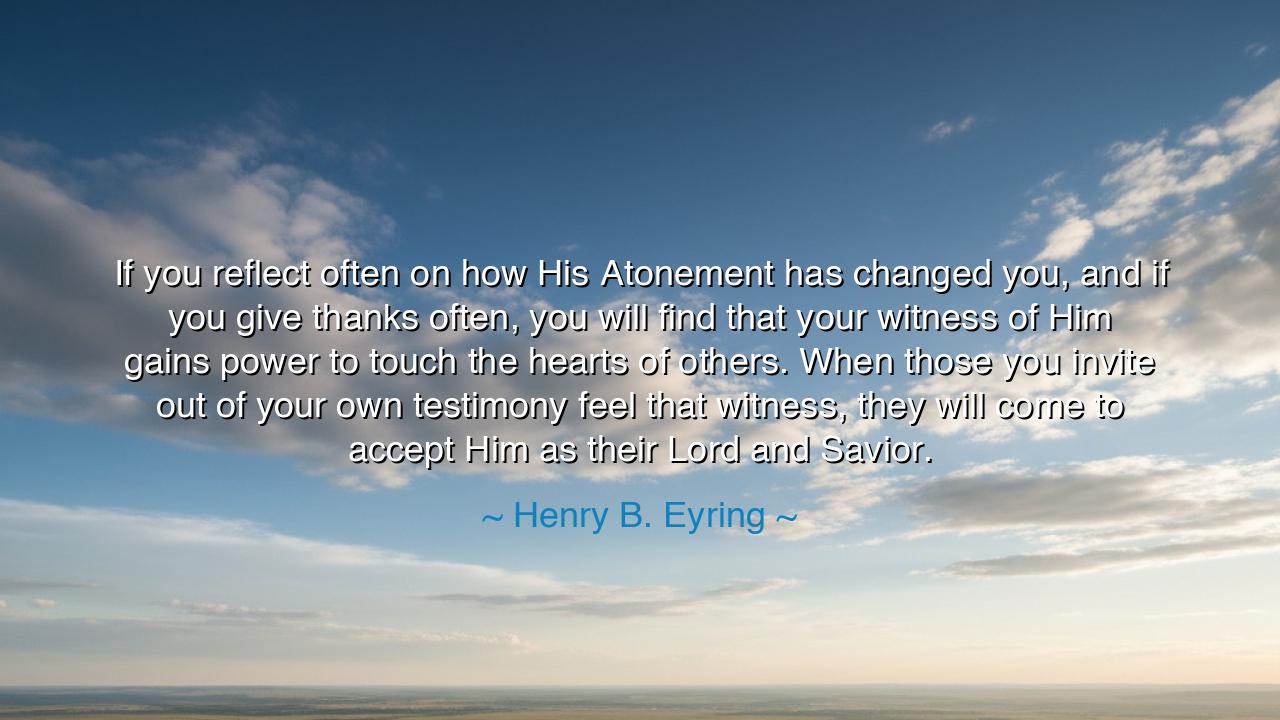
If you reflect often on how His Atonement has changed you, and
If you reflect often on how His Atonement has changed you, and if you give thanks often, you will find that your witness of Him gains power to touch the hearts of others. When those you invite out of your own testimony feel that witness, they will come to accept Him as their Lord and Savior.






The words of Henry B. Eyring rise like a sacred hymn: “If you reflect often on how His Atonement has changed you, and if you give thanks often, you will find that your witness of Him gains power to touch the hearts of others. When those you invite out of your own testimony feel that witness, they will come to accept Him as their Lord and Savior.” This is no casual saying, but a summons to remembrance, gratitude, and testimony. It teaches that the strength of our witness does not come from eloquence or argument, but from the fire of personal change wrought through Christ’s Atonement, fanned into flame by constant thanksgiving.
To reflect is to turn inward, to see again the marks of grace upon the soul. Many live without pausing, forgetting how far they have been carried, how much they have been forgiven, how deeply they have been healed. But he who remembers often, who contemplates how the Atonement has transformed his life, grows tender, humble, and radiant. From such remembrance springs gratitude—not the shallow thanks of lips, but the deep welling up of the heart that knows it has been saved. And this gratitude becomes a light, shining not only within but outward to others.
A witness, as Eyring declares, is not a scholar’s lecture, nor a debater’s craft, but the living overflow of a heart touched by Christ. When one speaks not of theory but of transformation, not of distant doctrine but of personal redemption, the words bear a strange power. They pierce. They move. They awaken. The listener, though perhaps skeptical, cannot deny the weight of lived truth. Thus, the true power of testimony lies in the union of reflection, gratitude, and the courage to share.
Consider the life of John Newton, once a slave trader upon the seas. His heart was hardened by greed and sin, until one stormy night when he cried out to God for mercy. In that hour, he tasted the grace of Christ’s Atonement, and his life was changed forever. Newton never forgot the pit from which he had been lifted. He reflected often, he gave continual thanks, and from his heart sprang a testimony that touched generations. Out of this gratitude was born his hymn, Amazing Grace, whose words have stirred millions to seek the Savior. His witness was powerful not because he spoke of abstract faith, but because he himself had been transformed by it.
The ancients, too, bore this wisdom. The apostle Paul declared, “I am crucified with Christ: nevertheless I live; yet not I, but Christ liveth in me.” His power to move hearts did not come from philosophy or argumentation alone, but from the lived truth that he, once a persecutor, had been redeemed. His gratitude overflowed into songs, letters, and courage that could not be quenched, even by prison or death. So it has ever been: testimony born of remembrance and thankfulness carries an authority beyond human reasoning.
What, then, is the lesson for us? It is this: if you desire to touch the hearts of others, first guard the fire of your own soul. Reflect often on what Christ has done for you. Give thanks continually, for thanksgiving fuels the warmth of your spirit. Speak openly, not of lofty theology alone, but of your personal journey, of the chains He broke, of the peace He brought, of the strength He gave. In doing so, you invite others not into arguments, but into the living reality of grace.
Practically, let each of us set aside time each day to reflect upon the mercies of the Lord. Write them in a journal. Speak them in prayer. Share them with your family. Cultivate gratitude by naming aloud the blessings that flow from the Atonement—forgiveness, hope, strength, comfort. Then, when opportunities arise, bear simple, heartfelt testimony. Do not wait for perfect words; let honesty and gratitude be your eloquence. Even if many turn away, some will feel your witness and be drawn to Him.
Thus, Henry B. Eyring’s teaching becomes a living torch: remembrance fuels gratitude, gratitude fuels witness, and witness draws souls to the Savior. Let us walk this path, reflecting, thanking, and testifying, until our lives themselves become hymns that lead others to Christ. Reflect. Give thanks. Bear witness. Live changed. In this lies the power to touch hearts and to help souls find the Lord of Light.






AAdministratorAdministrator
Welcome, honored guests. Please leave a comment, we will respond soon